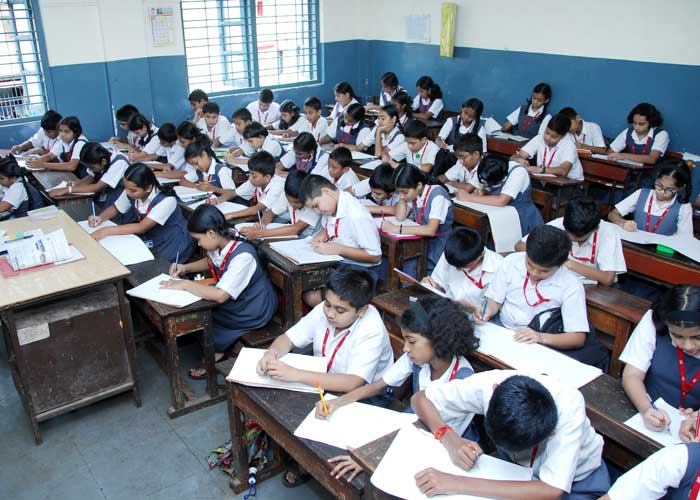‘Shaming terrible tool for teaching’

Teachers say that the number of students in a class is a huge problem which results in frequent outburst of anger from the teachers and lack of interest from students
Last week Kerala State Child Rights Commission ruled that humiliating or publicly rebuking a child is a gross violation of child rights and should be treated as an offence. The commission further said the police should register a case, if needed, against the perpetrators when such instances are brought to their notice.
The rights panel was hearing a complaint against authorities of an English medium school in Wayanad, Kerala, for ill-treating a Class third student, earlier this year. According to the complaint, the nine-year-old child was mocked in front of the school assembly and shamed for sporting a hairstyle which led to him feeling ashamed and not eating his meals or wanting to go to school for days to come.
According to the parents of the nine-year-old, authorities pointed out the hairstyle during the school assembly and rebuked the student in front of 800 other students. They also say that though the school principal is empowered to ensure discipline on the campus, action should be taken in proportion to the gravity of the indiscipline.
“Humiliating a child publicly will cause mental agony and lower the child’s self-esteem,” ruled Commission’s division bench, comprising K Nazeer and B Babitha.
“While shaming or humiliating may seem like the most obvious resort and the easiest one in order to punish and deter children from repeating their mistakes; it has the worst long term effects on them,” Anandita Anand, a psychologist at a private hospital in New Delhi tells Media India Group.
“Especially for a kid who’s nine or 10 years old and still is in elementary school, this becomes a memory of a lifetime,” she adds. Anand further explains that humiliating or shaming young kids publically in school or at home by parents or any elder does not solve the purpose of punishment. In fact, it turns them into rebellious and under confident adults.
“I have dealt with adults who had suffered humiliation as children in school, in playgrounds or just in front of other family members. They have grown up but are still living under the trauma of that insult. I think humiliation is a terrible tool to teach anything to children,” Anand says.
Contrary to what Anand and Kerala State Child Rights Commission think, many parents and teachers think that shaming a child is no big deal. “I think we all worry way too much about upsetting children,” says Mukesh Shah, a 50-years-old school teacher from Patna, Bihar.
“If it is done routinely or at an extreme level, then of course I would agree it undermines self-esteem, as well as stifling creativity and curiosity because everyone becomes too afraid to be themselves or speak out for fear of looking like an idiot. But otherwise, I don’t think we should be quite so quick to kick up a fuss,” he adds.
Shah is a Hindi teacher in a private school in Bihar’s capital. He teaches students of class six to eight. He explains that the number of students in a class is a huge problem for him and all his colleagues which also results in frequent outburst of anger from the teachers and lack of interest and interaction from students.
“I teach a class of 60-70 students at a time. It is just not possible for me keep my anger in check if even three of them disturbs the class or makes the slightest of noise. It is already too much for me to teach 5-6 classes of 70 students per day, answer their queries and check their notebooks. School authority doesn’t understand this and asks us to be patient with the kids, no matter what and on most days, it is extremely difficult to not express instant anger,” he explains.
He also says that while he believes in making a personal connection with his students, the severe misbalance in the ration of students and teachers in past few years has barred him from doing so. “I won’t prefer shaming students. I would prefer developing a personal bond and making them understand their mistakes and teach them of the consequences it can have in long run. But it is impossible to do that in a class full of 70,” he says.
While the school authorities, where Shah teaches, didn’t comment on the possible solution to the problem that Shah points out at, they do acknowledge that number of students, lack of feedback and lack of communication between the parents, teachers and students often results in in students facing the brunt of shaming and humiliation.
“This is not something that will change overnight. The whole system needs to be revised where teachers and parents can have a conversation about their kids and pay attention to their behaviour. An approach of actively being involved in the growth of kids is needed and not one where teachers are forced to humiliate kids in order to teach them,” adds Anand.
“I have seen that kids learn better in smaller groups and tend to imitate the behaviour of their elders if they confide in them. It is the duty of the school authorities to make a safety net for students as well as teachers. They should regulate the number of students, decrease the burden of teachers and improve communication between them, not immediately but surely,” she says.









